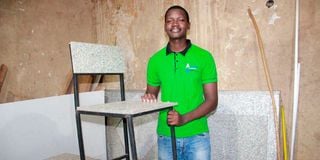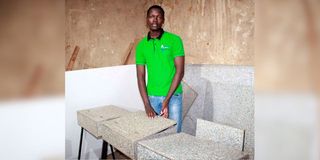Premium
Start-up turns marine plastic waste into eco-desks, chairs

Churchill Atieli of Twende Green Ecocycle displays a chair and desks at their workspace in Majengo, Mombasa County.
What you need to know:
- Local start-up addresses growing marine pollution while also contributing to education.
- The firm's solution leverages recycled plastic waste to manufacture affordable desks.
Reasonably priced, durable and flexible, plastic pervades modern life, appearing in almost everything from packaging to clothes to beauty products. But it is thrown away on a massive scale.
According to the United Nations Environmental Agency, the world is inundated with plastic waste. Half of the 400 million plastic tonnes manufactured each year are meant for single use.
Large volumes of plastic remain in the environment for extended periods, posing a threat to both human and planetary health.
The primary cause of these escalating negative effects is the nearly exponential and ongoing rise in plastics usage and manufacturing worldwide.
The problem will probably get worse due to anticipated changes in consumer patterns, urbanisation and population expansion.
Less than 10 per cent of the 172 million plastic tonnes that are consumed in Africa get recycled. Between 19 and 23 million tonnes are thought to end up in lakes, rivers and oceans, having a catastrophic impact on the ecology, economy and society.
Local start-up TwendeGreen Eco-cycle recycles marine plastic waste from informal settlements into high-quality, reasonably priced, and long-lasting school eco-desks and chairs, while also fostering job opportunities and economic growth for the surrounding community.
This helps to address Kenya’s growing marine plastic waste problem while contributing to education development.
The social venture was founded in January 2023 by Churchill Muriuki, Lawrence Kosgei, Zainab Mahmoud and Faraj Ramadhan.
“Mombasa Plastics Prize; an initiative that brought together young innovators from Mombasa to find innovative solutions to tackle marine plastic waste, gave rise to TwendeGreen Eco-cycle. Our team won this competition overall, which confirmed our vision and gave us the first push to make our idea a reality,” says Mr Muriuki.
“For us, receiving this award was not just an accolade; it was a spurt that drove us forward and gave us the self-assurance and means to make a big difference,” he adds.
He says their initial capital was Sh3.5 million which they won from the Mombasa Plastics Prize.
“We used it to purchase some of the essential equipment, leased a workspace and covered initial operational costs. This financial support allowed us to establish a solid foundation, from which we could start collecting, processing and recycling plastic waste into school furniture,” he says.
Mr Muriuki outlines the challenges faced by schools nationwide due to the high prices of wooden school furniture.
Their solution, which is now being introduced in schools in Mombasa’s informal settlements, leverages recycled plastic waste to manufacture affordable desks, that are both environmentally conscious and uncompromising in quality.

Churchill Atieli of Twende Green Ecocycle displays a chair and desks at their workspace in Majengo, Mombasa County.
The company buys plastic waste from the local plastic collectors from informal settlements, community-based organisations, and plastic waste collecting companies that transport the plastics to the warehouse.
“The plastic is sorted, cleaned and shredded upon arrival at our facilities to get it ready for transformation. Plastic boards are then produced by compressing the shreds of plastic with a press moulding machine under high pressure and temperature. Our carpenters then cut and assemble these boards to create eco-friendly school furniture, including desks and chairs,” he says.
The main goal of the TwendeGreen Eco-cycle is to simultaneously address the severe issue of marine plastic pollution and the shortage of school furniture.
“As Mombasa natives, we all witnessed the grave challenges of degraded environmental conditions and insufficient educational resources,” says Mr Muriuki, adding that by combining these two urgent problems, they envisioned a solution to address both the environmental degradation and the community’s need for education.
An innate love of the environment drove the founders’ foray into the recycling industry. Their mutual love of sustainability and environmental preservation drew them together and inspired them to explore the potential of recycling.
“Mombasa generates approximately 120 tonnes of plastic waste every day, of which only five percent is recycled. A significant portion of this waste is dumped into the ocean. It takes 13 kilograms of plastic waste, which would otherwise end up in the ocean and pollute the marine ecosystem,” he says.
TwendeGreen Eco-cycle has developed close ties with the Mombasa County Ministry of Education, which has acknowledged and supported the company’s efforts to supply sustainable school furniture.
The company has also received approval and support from several respectable organisations, including USAID and Challenge Works UK.
“We serve primary schools, corporate entities, junior secondary schools, and non-governmental organisations. Our furniture solutions are made to last and are reasonably priced to cater for the different needs of our customers,” he states.
Currently, the company has employed seven people, including experts in a range of fields. Their prices, which range from Sh4,500 to Sh5,500 per desk, he says, are reasonable for their items and that once they start bulk production, the price will go down to affordable rates.
Their goals include becoming Kenya’s premier supplier of sustainable furniture, drastically lowering plastic pollution and supporting environmental conservation, even though he recognises that they have encountered challenges, such as changing people’s attitudes towards recycled goods and obtaining the necessary machinery for effective production.
Regarding entering the cut-throat market, he agrees that a multifaceted strategy is required.
“We leveraged social media to showcase our products to a larger audience. Our dedication to sustainability and quality helped us stand out in the congested industry, and marketing and advertising were key factors in developing our brand presence,” he says.
Looking ahead, TwendeGreen Eco-cycle intends to diversify into various types of office and household furniture, according to Mr Muriuki.
“We are committed to leaving a lasting impact through our work, and we believe in the power of innovation and collaboration to create a better world. In addition to endangering coastal tourism and marine life, marine plastics contribute to climate change. When plastics get into oceans, they break down into micro-plastics which are consumed by marine animals,” he says in conclusion.
The company has accomplished several noteworthy milestones. In addition to receiving the Mombasa Plastics Prize, they were privileged to meet both the US Ambassador to Kenya and King Charles during his royal visit to Kenya.





